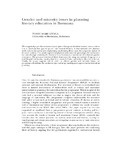| dc.contributor.author | Maruatona, T. | |
| dc.date.accessioned | 2010-06-16T13:15:43Z | |
| dc.date.available | 2010-06-16T13:15:43Z | |
| dc.date.issued | 2005 | |
| dc.identifier.citation | Maruatona, T. (2005) Gender and minority issues in planning literacy education in Botswana, International Journal of Lifelong Education, Vol. 24, No. 2, pp. 149-164 | en_US |
| dc.identifier.issn | 0260-1370 | |
| dc.identifier.uri | http://hdl.handle.net/10311/513 | |
| dc.description.abstract | This empirical paper demonstrates that in spite of being a multiethnic society, literacy education in Botswana has ignored gender and cultural diversity. It demonstrates how planners endorsed a technocratic view of planning, emphasizing their curriculum expertise instead of learners' realities. The article argues that planners systematically ignored gender and minority issues through assuming that learners shared common concerns and that they are passive consumers. The planners reinforced their dominance by using one national language in a multilingual community, arguing that it is a natural choice and nobody objected to its use. Finally, the paper suggests that in order to address gender and minority issues, the programme should use the mother tongue and adopt participatory approaches in curriculum planning. | en_US |
| dc.language.iso | en | en_US |
| dc.publisher | Routledge. http://www.informaworld.com | en_US |
| dc.subject | Gender | en_US |
| dc.subject | Minority groups | en_US |
| dc.subject | Education | en_US |
| dc.subject | Botswana | en_US |
| dc.title | Gender and minority issues in planning literacy education in Botswana | en_US |
| dc.type | Published Article | en_US |

